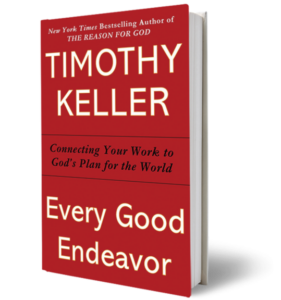“So whether you eat or drink or whatever you do, do it all for the glory of God”
1 Corinthians 10:31
What gets you out of bed in the morning? And perhaps more importantly, why does it motivate you to put your feet on the floor and move forward?
In Every Good Endeavor: Connecting Your Work to God’s Work, Timothy Keller (with Katherine Leary Alsdorf) argues that work is integral to our fulfillment as beings created in God’s image. God designed us from the beginning to delight in the work He gives us. Our first vocation, in Eden, was to garden. As Keller observes, gardening involves cultivating the raw material of the world, shaping, arranging, and limiting it in order to create more beauty, draw more food or coax more usefulness from what was there. As God worked creatively and joyfully, we were made to work creatively and joyfully.
Does any of that sound like what you do, or aspire to do?
We are often vexed by this. We long to achieve an ideal, a vision of beauty or order, of goodness and usefulness, and can never quite get there. We experience frustration and friction in our work and relationships. We get tired. We struggle to find meaning in the endless “maintenance” jobs of life, or to find meaningful work at all.
God’s original plan – a delightful relationship between us and our work, each other and Him, was undone by sin. In the world we inhabit now, nothing is untouched by sin, including work. But Jesus came to redeem the world: soul and body, work and creation, living and dying. He came to make all things new. As Keller says, “If the God of the Bible exists, and there is a True Reality beneath and behind this one, and this life is not the only life, then every good endeavor, even the simplest ones, pursued in response to God’s calling, can matter forever. That is what the Christian faith promises.”
Which gets to motivation: who are you working for?
If our work is redeemed through the gospel, then the attitude we take to work, the way in which we carry it out, and the results of our work can bring glory to God, regardless of our occupation. How might you walk that out in real life? The final section of the book discusses this; for example you might:
learn to recognize and resist the idols peculiar to your profession
utilize your Christ-like mindset and worldview in making decisions and relating to others
model rest and excellence in your work
As we do our work, which God has given us to do, for Him, we are able to work with more creativity, purpose and freedom. We know that in the end, we work for a Kingdom and a King that cannot fail.
I’d love to hear from you: what hobby, job, or other endeavor that you engage in brings you the most joy?
